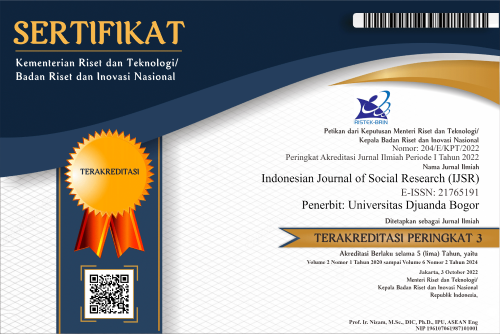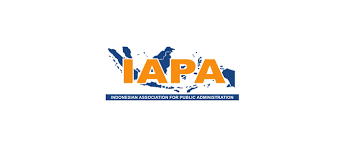How Implementing of Social Capital to Improving Islamic Education Quality: The Social Evolution Model
Abstract
Social change is a phenomenon that often occurs in life that demands improvement and creates shared prosperity to strengthen social capital as a component involved in it. The low average formal education in Indonesia is still low in Southeast Asia, which gives the impression that most Muslims do not have adequate quality education because there are still many people who are socially marginalized. The number of graduates of Islamic education itself is low. They make men more dignified by utilizing resources to create new things and have a wider impact. Islam has described social capital and social change in life as necessary to create a more dynamic value of life. This study is to find out how social capital is implemented by social capital to improve the quality of education with a social evolution approach. The method uses qualitative research using a grounded theory approach and analytical design thinking. The results show that come contents of social capital as a component of change that can improve the quality of Islamic education, including trust, networks, norms, and leadership, which are built on six models of social evolution, namely empathy, exploration, elaboration, exposure, and execution and expansion. The social evolution model built on design thinking can formulate efforts to improve the quality of Islamic education through strengthening the social capital formed. Research implies that improving Islamic education can be adapted to social changes in social modal, specifically in the human resources index.
References
Acar, E. (2011). Effects of social capital on academic success: A narrative synthesis. Educational Research and Reviews, 6(6), 456–461.
Achyar, H., Andriani, H., Ustiawaty, J., Utami, E. ., Istiqomah, R., Fardani, R. ., Sukmana, D. ., & Auliya, N, K. (2020). Buku Metode Penelitian Kualitatif & Kuantitatif (Issue March). Pustaka Ilmu Group.
Ahkamiyah, N., & Rosyidi, S. (2019). Analisis Kritis Program Pengelolaan Dana Zakat Dan Infak Dalam Membentuk Modal Sosial Masyarakat. Jurnal Ekonomi Syariah Teori Dan Terapan, 5(7), 592. https://doi.org/10.20473/vol5iss20187pp592-605
Al-Bayan. (2010). Shahih Bukhari Muslim. Jabal.
Ariah, & Widyasari. (2020). Implementation of School Culture Program in Character Education Strengthening. Indonesian Journal of Social Research (IJSR), 1(2), 50–58. https://doi.org/10.30997/ijsr.v1i2.16
Azra, A. (2012). Pendidikan Islam :Tradisi dan Modernisasi di Tengah Tantangan Melenium III. Kencana Prenada Media Group.
Chapra, M. U. (2008). Ibn Khaldun’s theory of development: Does it help explain the low performance of the present-day Muslim world? Journal of Socio-Economics, 37(2), 836–863. https://doi.org/10.1016/j.socec.2006.12.051
Charities Aid Foundation. (2021). World Giving Index 2021 (Issue June). www.cafonline.org
Creswell, J. W. (2013). Qualitative inquiry and research design : choosing among five approaches (3rd ed.). Sage Publication.
Elvira. (2021). Faktor Penyebab Rendahnya Kualitas Pendidikan dan Cara Mengatasinya ( Studi pada : Sekolah Dasar di Desa Tonggolobibi ) Factors Causing the Low Quality of Education and How to Overcome It ( Study on : Elementary School in Tonggolobibi Village ). IQRA: Jurnal Ilmu Kependidikan Dan Keislaman, 16(2), 93–98.
Fadli, M. R. (2020). Peran Modal Sosial dalam Pendidikan Sekolah. Equilibrium: Jurnal Pendidikan, 8(2), 152–161. https://doi.org/10.26618/equilibrium.v8i2.3363
Fathy, R. (2019). Modal Sosial: Konsep, Inklusivitas dan Pemberdayaan Masyarakat. Jurnal Pemikiran Sosiologi, 6(1), 1. https://doi.org/10.22146/jps.v6i1.47463
Fukuyama, F. (2014). The Great Disruption: Hakikat Manusia dan Rekonstitusi Tatanan Sosial (Terjemahan). Al-Qalam.
Halimah, N., & Zaki, I. (2020). Pengelolaan Modal Sosial Dalam Meningkatkan Kesejahteraan Masyarakat (Studi Kasus Baitul Maal Hidayatullah Surabaya). Jurnal Ekonomi Syariah Teori Dan Terapan, 7(5), 842. https://doi.org/10.20473/vol7iss20205pp842-851
Huda, M. (2015). Peran Pendidikan Islam Terhadap Perubahan Sosial. Edukasia : Jurnal Penelitian Pendidikan Islam, 10(1), 165–188. https://doi.org/10.21043/edukasia.v10i1.790
Irwan, M., Herwanti, T., & M. Firmansyah. (2021). Peranan Modal Sosial Islami Dalam Mengurangi Penduduk Miskin Di Nusa Tenggara Barat (NTB). Elastisitas - Jurnal Ekonomi Pembangunan, 3(1), 26–43. https://doi.org/10.29303/e-jep.v3i1.35
Iryani, E., & Ramdani, A. S. (2019). Kajian Indeks Pembangunan Manusia (IPM); Analisa Pengaruh Rendahnya Indeks Pendidikan di Kabupaten Tangerang. Jurnal Inovasi Pendidikan MH Thamrin, 3(2), 1–11. https://doi.org/10.37012/jipmht.v3i2.97
Kafid, N., & Rohmatika, A. (2019). Academic Social Capital And Institutional Transformation Of Islamic Higher Education In Indonesia. Akademika: Jurnal Pemikiran Islam, 24(2), 335–352.
Kartono. (2015). Social Capital and Quality Improvement at the Junior High School VIP Al-Huda in Kebumen, Central Java, Indonesia. EDUCARE: International Journal for Educational Studies, 7(2), 147–160. http://journals.mindamas.com/index.php/educare/article/view/316
Kemenag. (2015). Al Qur’an dan Terjemah. Darus Sunnah.
Kilpatrick, S., Johns, S., & Mulford, B. (2010). Social capital, educational institutions and leadership. International Encyclopedia of Education, February, 113–119. https://doi.org/10.1016/B978-0-08-044894-7.00426-7
Moreira, J., Santos, J., Palma, G., & Tschimmel, K. (2021). Design Thinking para a Inovação Social Desenvolvimento do modelo Social Evolution 6. In Coleção Convergências Research Books (Issue 2, pp. 169–176). Edições IPCB.
Muchtarom, M. (2013). Islamic Education in the Context of Indonesia National Education. Jurnal Pendidikan Islam, 28(2), 323. https://doi.org/10.15575/jpi.v28i2.551
Murray, R., Grice, J. J., & Mulgan, G. (2010). The Open Book of Social Innovation. www.socialinnovator.info
Naldo, J. (2019). Islam dan Modal Sosial Orang Minangkabau di Perantauan. Jurnal Penelitian, 13(2), 267.
Ningsih, D., & Jalil, A. (2017). Perubahan Sosial Budaya Suku Sakai Kampung Minas Barat Kecamatan Minas Kabupaten Siak. JOM, 4(2), 1–9.
Palma, G. T. (2020). Design Thinking for Social Innovation in an Era of Social Distancing: a Proposal for a Workshop Programme. University Do Porto.
Rahman, A., Syukur, M., & Rifal, R. (2020). Pelestarian Lingkungan Melalui Partisipasi Petani Dalam Pembentukan Ruang Publik Di Desa Bulutellue. Sosial Horizon: Jurnal Pendidikan Sosial, 7(1), 76. https://doi.org/10.31571/sosial.v7i1.1648
Rogošić, S., & Baranović, B. (2016). Social Capital and Educational Achievements: Coleman vs. Bourdieu. Center for Educational Policy Studies Journal, 6(2), 81–100. https://doi.org/10.26529/cepsj.89
Rosyadi, K. (2015). Islam, Modal Sosial, Pembangunan dan Pengentasan Kemiskinan. Dimensi, 8(1), 1–12. http://www.ainfo.inia.uy/digital/bitstream/item/7130/1/LUZARDO-BUIATRIA-2017.pdf
Saharuddin, Mahmud, M., Ondeng, S., & Rahman, U. (2020). Social Capital Analysis as a Pattern of Developing Islamic Education. Didaktika Religia: Journal of Islamic Education, 8(1), 197–214.
Sanrego, Y., & Taufik, M. (2016). Fiqh Tamkin (Fiqih Pemberdayaan) (Q. Press (ed.)).
Santoso, T. (2020). Memahami Modal Sosial.
Saputra, T., Aguswan, A., Syofian, S., & F.S, H. T. (2021). Model Penguatan Modal Sosial Pembangunan Budaya dan Kearifan Lokal Suku Sakai kabupaten Bengkalis. Sosio Konsepsia, 10(2), 147–158. https://doi.org/10.33007/ska.v10i2.2063
Saukani, N., & Ismail, N. A. (2019). Identifying the Components of Social Capital by Categorical Principal Component Analysis (CATPCA). Social Indicators Research, 141(2), 631–655. https://doi.org/10.1007/s11205-018-1842-2
Thobias, E., Tungka, A. K., & Rogahang, J. J. (2013). Pengaruh Modal Sosial Terhadap Perilaku Kewirausahaan (Suatu studi pada pelaku usaha mikro kecil menengah di Kecamatan Kabaruan Kabupaten Kepulauan Talaud). Acta Diurna, April, 1–23.
Utomo, E. P. (2018). Internalisasi Nilai Karakter Nasionalis dalam Pembelajaran IPS Untuk Membangun Jati Diri Ke-Indonesia-an. SOCIA: Jurnal Ilmu-Ilmu Sosial, 14(2), 95–102. https://doi.org/10.21831/socia.v14i2.18626
Widayani, R., & Rahman, N. (2013). Studi Tentang Kemunculan Modal Sosial. Jurnal Kebijaka & Administrasi Publik2, 17(2), 65–75. https://doi.org/10.1190/segam2013-0137.1
Zubaidillah, M. H. (2018). Concept Of Islamic Education In The Qur’an. OSF Preprints, July 2018, 1–13.
Copyright (c) 2022 Indonesian Journal of Social Research (IJSR)

This work is licensed under a Creative Commons Attribution-ShareAlike 4.0 International License.
The Authors submitting a manuscript do so on the understanding that if accepted for publication, copyright publishing of the article shall be assigned/transferred to Indonesian Journal of Social Research (IJSR) Universitas Djuanda as Publisher of the journal. Upon acceptance of an article, authors will be asked to complete a 'Copyright Transfer Agreement'. An e-mail will be sent to the corresponding author confirming receipt of the manuscript together with a 'Copyright Transfer Agreement' form by online version of this agreement.
Indonesian Journal of Social Research (IJSR) Universitas Djuanda, the Editors and the Editorial Board make every effort to ensure that no wrong or misleading data, opinions or statements be published in the journal. In any way, the contents of the articles and advertisements published in the Indonesian Journal of Social Research (IJSR) Universitas Djuanda are sole and exclusive responsibility of their respective authors and advertisers.
Remember, even though we ask for a transfer of copyright, our journal authors retain (or are granted back) significant scholarly rights as mention before.
The Copyright Transfer Agreement (CTA) Form can be downloaded here: Copyright Transfer Agreement-IJSR 2020
The copyright form should be signed electronically and send to the Editorial Office e-mail below:
Dr. Rasmitadila, M.Pd (Editor-in-Chief)
Universitas Djuanda
Jl. Tol Jagorawi No.1, Ciawi, Kec. Ciawi, Bogor, Jawa Barat 16720
Website: http://journal.unida.ac.id/index.php/IJSR/index
Email: ijsr@unida.ac.id





4.png)



